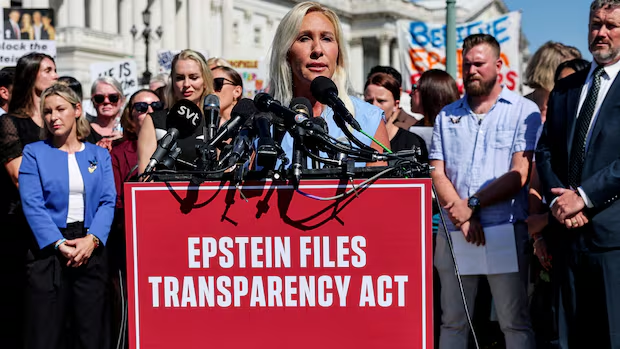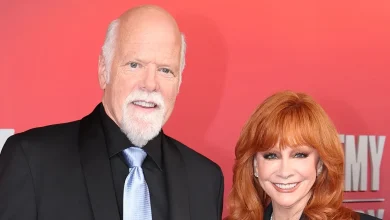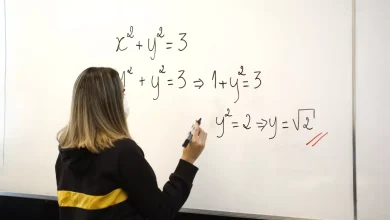In reversal, Trump urges Republicans to vote to release Epstein files

Listen to this article
Estimated 5 minutes
The audio version of this article is generated by text-to-speech, a technology based on artificial intelligence.
U.S. President Donald Trump on Sunday urged his fellow Republicans in Congress to vote for the release of files related to the late convicted sex offender Jeffrey Epstein, reversing his earlier resistance to such a move.
Trump’s post on his Truth Social came after House Speaker Mike Johnson said earlier that he believed a vote on releasing Justice Department documents in the Epstein case — which is expected to occur this week — should help put to rest allegations that Trump had any connection to Epstein’s abuse and trafficking of underage girls.
“House Republicans should vote to release the Epstein files, because we have nothing to hide,” Trump wrote on Sunday night. “And it’s time to move on from this Democrat Hoax perpetrated by Radical Left Lunatics in order to deflect from the Great Success of the Republican Party, including our recent Victory on the Democrat ‘Shutdown.'”
Trump’s desire to move on and change the conversation comes amid a politically rough patch. Republicans lost a small number of significant off-year elections earlier this month, and in a wide range of polls, more Americans believe the party is to blame for the recently ended six-week shutdown, even as it was initiated by the Democrats.
Trump has also reversed position on some tariffs, with White House officials telling reporters from multiple outlets last week that they want to shift focus to address affordability issues as Americans struggle with rising grocery prices and electricity bills.
Although Trump and Epstein were photographed together decades ago, the president has said the two men fell out before Epstein’s convictions. Emails released last week by a House committee suggested the disgraced financier believed Trump “knew about the girls,” though it was not clear what that phrase meant.
Trump, who has recently dismissed the Epstein files as a Democratic smear campaign, has since instructed the Department of Justice to investigate prominent Democrats’ ties to Epstein.
The battle over disclosure of more Epstein-related documents — a subject Trump himself campaigned on — has opened a rift with some of his allies in Congress.
WATCH | Trump calls Marjorie Taylor Greene a traitor:
Trump feuds with Marjorie Taylor Greene over Epstein files
U.S. President Donald Trump attacked his vocal Republican ally, Georgia Rep. Marjorie Taylor Greene, on social media seemingly over her push to release the Epstein files. The feud is dividing the MAGA movement and fuelling questions about Trump’s ties to the convicted sex offender.
Many of Trump’s most loyal supporters believe the government is withholding sensitive documents about Epstein, a convicted sex offender who died by suicide in jail in 2019, that would reveal the late financier’s ties to powerful public figures.
Trump late on Friday withdrew his support for U.S. Representative Marjorie Taylor Greene of Georgia, long one of his staunchest supporters in Congress, following her criticism of Republicans on certain issues, including the handling of the Epstein files.
U.S. Rep. Ro Khanna, a California Democrat and an original sponsor of the petition calling for a vote on the files’ release, said on Sunday that he expected more than 40 Republicans to vote in favour.
“I don’t even know how involved Trump was,” Khanna said. “There are a lot of other people involved who have to be held accountable.”
Khanna also asked Trump to meet with those who alleged they were abused by Epstein. Some will be at the Capitol on Tuesday for a news conference, he said.
Bill’s fate uncertain after House vote
The Epstein Files Transparency Act, as it is known, would force the Justice Department to release all files and communications related to Epstein, as well as any information about the investigation into his death in federal prison.
Information about Epstein’s victims or ongoing federal investigations would be allowed to be redacted, per the bill. The department, however, would not be allowed to redact information due to “embarrassment, reputational harm or political sensitivity, including to any government official, public figure or foreign dignitary.”
“Epstein is their entire game plan, so we’re going to take that weapon out of their hands,” Johnson said of the Democrats. “Let’s just get this done and move it on. There’s nothing to hide.”
WATCH | Outlining the possible next steps in Congress:
U.S. lawmakers release Epstein emails mentioning Trump. What comes next? | Hanomansing Tonight
More than 20,000 pages of documents from Jeffrey Epstein’s estate have been released by lawmakers, including some that reference Donald Trump. Andra Gillespie, political scientist at Emory University discusses what it all means, and what could come next.
The Senate isn’t obligated to take up measures voted on by the House. Senate Majority Leader John Thune has been circumspect about what the chamber would do, though.
Were a vote to pass in the Senate with 60 votes, Trump could still veto it, with a two-thirds vote in the House and Senate then needed to override his veto.
Trump has never been accused of wrongdoing in connection with Epstein and the mere inclusion of someone’s name in files from the investigation does not imply otherwise.
Virginia Giuffre, a former employee at Trump’s Mar-a-Lago estate who then publicly described as a yearslong association with Epstein and associate Ghislaine Maxwell as a trafficking victim, never accused Trump of any wrongdoing in either her recent posthumous memoir or under oath in a disposition years earlier.
Maxwell, in a controversial interview this summer, told the Justice Department she never saw Trump “in any inappropriate setting in any way.” Maxwell, who is serving a 20-year prison sentence for an assortment of charges, including sex trafficking of minors as young as 14, was subsequently moved to a minimum-security-institution.
As Maxwell still has an active appeal of her conviction, her interview participation was voluntary and not under oath.
Epstein was asked in a 2010 deposition if he had ever socialized with Trump “in the presence of females under the age of 18.” He ultimately asserted his legal right under questioning to refuse to answer questions or provide information.





